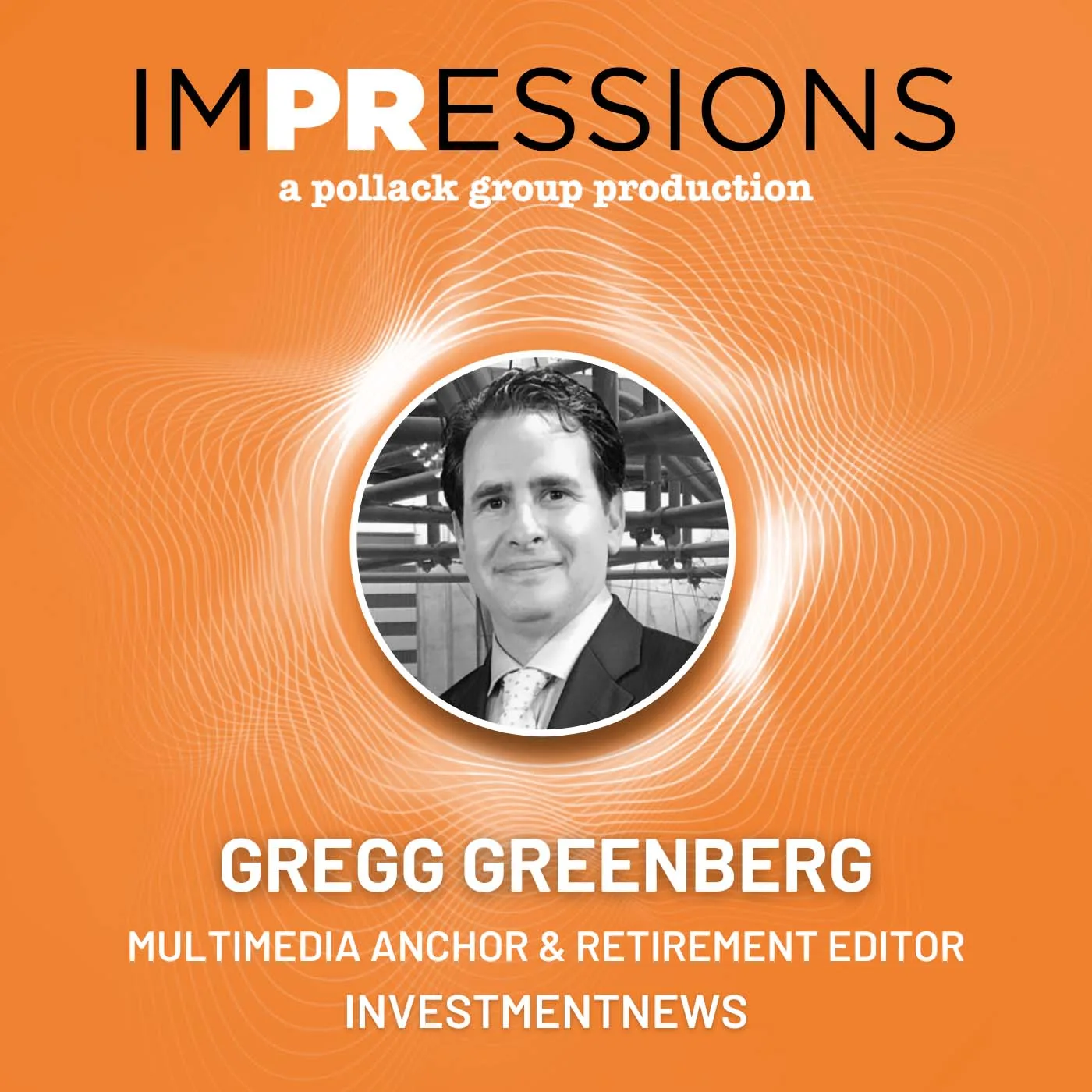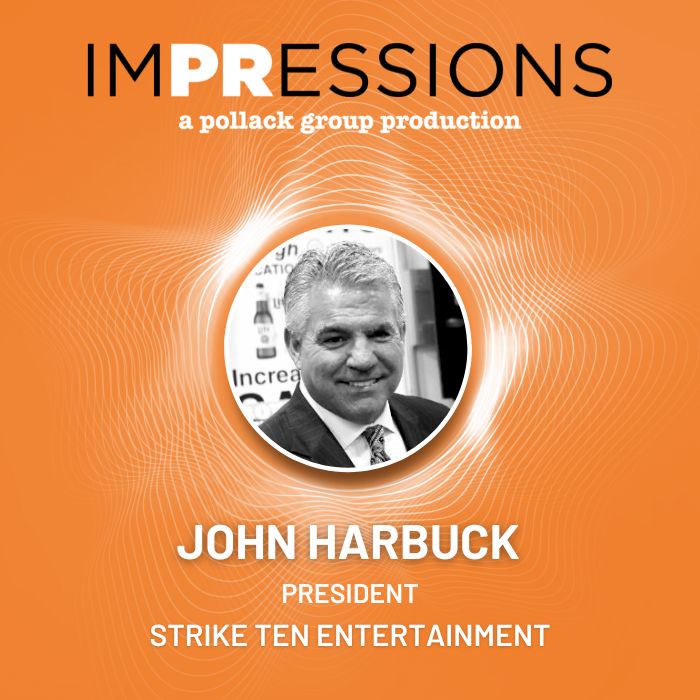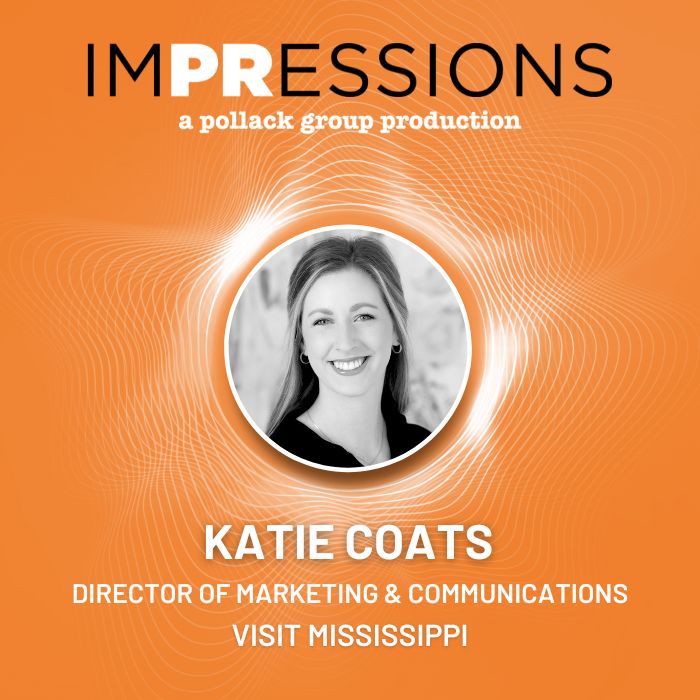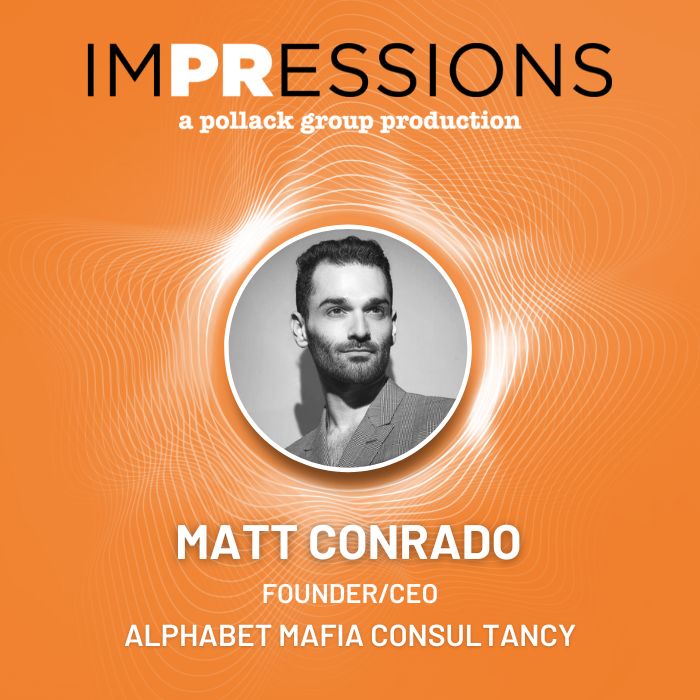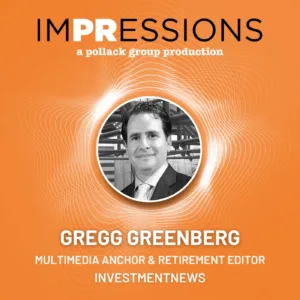 In the fast-paced world of public relations, securing media coverage is a top priority, and the pinnacle of success often lies in a primetime interview with a prominent anchor. But what happens next is crucial – ensuring the client shines during the segment. imPRessions episode 21 delves into the intricate art of conducting a powerful interview with iconic anchor Gregg Greenberg. From deciphering body language to mastering bridging techniques, Gregg shares invaluable tactics to help PR professionals navigate the challenging landscape of media interviews.
In the fast-paced world of public relations, securing media coverage is a top priority, and the pinnacle of success often lies in a primetime interview with a prominent anchor. But what happens next is crucial – ensuring the client shines during the segment. imPRessions episode 21 delves into the intricate art of conducting a powerful interview with iconic anchor Gregg Greenberg. From deciphering body language to mastering bridging techniques, Gregg shares invaluable tactics to help PR professionals navigate the challenging landscape of media interviews.
ImPRessions episode #20 Transcript
Jenn: PR professionals are usually tasked with one major function get media coverage, and if the story is just right, a prime-time live interview with a prominent anchor is a home run. As long as the client knows how to effectively conduct a successful interview, many factors are at play, from body language to bridging techniques. Sometimes conducting a powerful interview is rather challenging. Unless, of course, you have someone like Gregg Greenberg asking the hard-hitting questions. Gregg is a renowned anchor who has led his voice across various notable shows, and is here today to discuss tactics to help your client give the best interview possible. Hi Gregg, it’s a pleasure to have you.
Gregg: Thanks so much for having me on the show and I really appreciate the intro. Make me sound a whole lot better than I am. Make me sound good.
Jenn: Oh, you know, you know you’re a rock star. Come on. You’ve had quite the career. I’ve had the pleasure of working with you. In the past, you’ve been a producer, a reporter for CNBC, and you anchored the street for over a decade. Tell us a little bit about how you got started in your career path, and why you are passionate about this line of work.
Gregg: So I actually never went out to become a talking head, if you will. I went to business school in the mid-90s up at Cornell, and I came back and I worked at Lehman Brothers in the late 90s, and it was in the middle of the tech bubble. And when that bubble burst, I needed to find a new gig or new job, if you will. So one of my fallback skills was being able to write. So I got a job over at CNBC writing the news for them. And over there I met Jim Cramer, who a lot of folks may know is the booyah guy and the Mad Money guy, and he brought me over to a website of his called The Street. At the time, this is in the 2002 or so, it was the advent of internet video. So I would have fund managers and mutual fund managers come on and would interview them on this very basic camera setup. And as more people started watching those videos, we would get more viewers and they’d get the camera was better. Then they gave me a studio and I sort of became on the on the trail. So there was a loop. So guests would come in and fund managers and authors and CEOs, they’d go to CNBC, then they go to Bloomberg, then they came on my show over at the street. Then they might go to Jon Stewart or somewhere else. And then so I evolved into being the the interview guy over at the street. And then I got another job doing videos, and interviewing CEOs for the C-suite network. And then a little over a year ago, I got hired to interview fund managers and CEOs and authors at Investment News. And that’s what I do right now to make a short story long.
Jenn: And you say you’re not a rock star. Okay.
Gregg: Once again, I try.
Kalli: Yeah, you’ve had a pretty cool career there. And, you know, anchoring the street. And today a multimedia anchor and editor for Investment News. Finance has definitely been a prominent focus of your work. Was this a specific passion of yours? I know you said, you know, you went to business school or was this also something you kind of fell into a little bit more? So once you, you know, once you started working in media.
Gregg: I think that’s a great question. I think it’s a little bit of half and half. You know, I do like the business arena. I love talking about Wall Street and talking to people about Wall Street and found that, you know, when I was at Lehman Brothers, you know, selling individual securities to small funds, you know, you felt a little bit like a racetrack tout and you remove yourself from that when you’re in the media. So, you know, you don’t have to really take a position. This stock is going to go up because of this. You don’t have to really make any futuristic calls, which people can be skeptical about because no one can really tell the future. And I do have, you know, I do like speaking to people and have a little bit of a healthy ego and think being in the journalism world is fun because every day is new and the market is ever changing. I can’t say that there was a divine, you know, had a plan, but I had all the ingredients for the mix that I’m currently in.
Jenn: So you like talking about finance, though?
Gregg: Yeah. You know, it’s a lot of fun. You’ll learn a lot when you’re speaking about more about the markets than finance. So when you’re speaking about the markets, you know, right now, everyone’s talking about AI. You know, not too long ago, we were speaking about the debt ceiling. And before that, you know, we were speaking about another big thing that was going to change the world. And so you really have to be on your toes and you have to pay attention, you know, as opposed to if you’re in a particular type of business, you know, whether it’s the garment business, you’re always talking about clothing, but if you’re talking about Wall Street, you really have to be knowledgeable about a range of subjects. I’m an inquisitive person by nature, so think it suits me well.
Kalli: Now that makes so much sense. I actually before coming to The Pollack Group, I worked mainly in finance and financial services PR and you’re 100% right. You hit it right on the nose. You have to kind of know about everything and talk about everything because anything can affect the way the market works. And especially, you know, there’s different markets to be accounted for and to, to look into. So it’s super interesting. And you definitely become a very well-informed person because it’s so interesting. You just kind of have to try to suck in as much as you can and think.
Gregg: For PR folks, it’s quite important to be well-rounded and worldly and to be well read, especially about current events. Because when you’re pitching someone like me, I get pitches, multiple pitches all the time. So if someone reaches out to me and one of the things that’s important is if they actually know what my beat is and they know what I cover. So if they say something like, Greg, I just read your article about 401 or 529 plans, and I know that there’s something coming out of Washington. So the more worldly and knowledgeable the PR person is, the better the pitch is, and the more they stroke my ego, the more likely they’re going to get their guest on.
Jenn: Exactly. Bet you get some PR people that don’t quite look at your work and probably put you on some astronomical topic that you’re like, I don’t do this, I don’t cover this.
Gregg: So that’s a great point. So one of the things I try and do is I can hear pretty early on when the person contacting me is new to the business, because sometimes they’ll read from a script, they’ll say, hello, Mr. Greenburg, I’m pitching this guest, but you know, and then I’ll stop them right there and I’ll say, look, you know, it sounds like you’re pretty new to this. One of the things you might want to try is you might want to say, look, I just read your article on this. You know, our guest can speak about that. And if you present your client in a knowledgeable way, which knows exactly what I do, because, you know, I get a lot of computerized pitches from, you know, people who don’t know what I do, and I know them immediately from the first two words, and I just delete them. Yep. So, it’s important for people reaching out to me to know what I do, and I’ll let them know if someone does that twice, then they’re dead to me.
Jenn: You know what someone might not know that you do is you’re a screenwriter.
Gregg: Yeah. Try. Yes. Once again, I guess the theme when you guys go out and promote this interview or this podcast, the theme of this is that Greg tried. Yes. So did write the other thing. The other thing is, is that, you know, most of your, your ink-stained wretches, your journalists out there, you know, they have dreams too, because they are overeducated and underpaid. So most of them will have a screenplay or a novel in their desk drawer that they’re dying to work on. So, I was lucky enough. I did write a movie that was called Friends and Romans. It was in theaters and film festivals about 7 or 8 years ago, and had a lot of the folks from The Sopranos were in it, and it was a great experience. And since then, I’ve written a few plays that have been up Off-Broadway and off Off-Broadway. I did write a book that you can find on Amazon called F-ing Argentina. So I think it’s important for people to explore their creative side while they watch the news.
Jenn: Is that what kind of prompted you to write the script for Friends and Romans, where you just sort of like in this inspirational, you know, aha moment where you wanted to do something a little bit different? How did it come about?
Gregg: I actually first wrote a play called Clemenza and Tess You Are Dead. And for theater folks out there, what they’ll recognize is that’s kind of a takeoff on Rosencrantz and Guildenstern Are Dead, which is a famous Tom Stoppard play. And what Tom Stoppard does in his play is he tells a story of Hamlet from the two minor characters. So I got the idea when I was working at the street, and it was fairly random that I could do the same thing with the movie The Godfather. So in my play, Clemens and Cecil are dead. I rewrote the story of The Godfather from the perspective of the two minor characters, Clemens and Tessio, who people will recognize if they’re mob movie fans. And after writing that play and when casting that particular play, I got the idea to write Friends and Romans, which was a cute little mob comedy.
Kalli: As an Italian from New York, my family were very big into mob movies. I’ve seen more than I probably needed to in my life, but I definitely will check that out because it sounds really interesting. And, you know, it was really cool that you get to be be so creative and let that energy flow into other things. But I do want to pivot back to the world of anchoring. You know, obviously, you know, you’ve had a lot of interviews that have stuck with you. And in your experience, what makes an interview memorable, like what makes the interview something that you’ll remember, but also that people will continue to talk about after it’s aired?
Gregg: I like learning from the guests. So one of the things about a memorable interview, sure, there’s some times when the guests will say something, you know, shocking or curse… I like it when I learn from the guests. So it’s important for the interviewer, I feel I interview a lot of bestselling authors. It could be Thomas Friedman or Paul Krugman, you know, or it could be, you know, an athlete or an actor who wrote a book because there’s always a business story involved somewhere. So I always read the book before I have the guest on, and that helps. And I do like it when, when the author or the guest tells me something I didn’t know something. Maybe that’s not in the book. So I think that that’s a healthy interview from my side, and overall, I think a successful interview is when I like letting the guest speak, but I like it when the guest keeps it tight. So if you ever watch any of my interviews, whether it be at The Street or investment news, before the guest sits down, I generally tell them, I say, look, this is not a half hour Charlie Rose piece. This is a video that my videos generally last around 4 to 5 minutes. So I tell them, you got to keep the answers around 25 seconds. And if I’m nodding my head, it means land the plane. Or in other words, finish your answer. Because if the guest is rambling on, I’m going to get bored. And if I’m getting bored, then the viewer is going to get bored. And one of the things also another reason, you know, I think that my interviews are generally easy to watch is because keep my questions nice and short and don’t interrupt the guest. So a lot of the folks in PR, they’re going to get a guest on MSNBC or CNBC, and I’m not going to name names, but what you’re going to find is you’re going to have the guest interrupt, the anchor is going to interrupt the guest. I won’t do that because I’m going to tell them ahead of time “If you keep your answers short, then I’m not going to interrupt you”. And I know that I just said, you know, for folks to keep their answers short and then just ramble on for the last minute but think it’s really important. Tell your guests, tell your clients. If you’re in the business, keep the answers 30s and hopefully you know the anchor will keep their questions short as well. Nice tight interviews. People love those.
Jenn: Well, but it depends on the reporter. Think too. And you kind of sound like a dream reporter in that regard. You’re going to tell the guests exactly what they need to know before going into the interview. But what would be some of your advice for maybe somebody that’s going on a primetime live interview on CNBC and, you know, as an example, and that reporter is a little bit aggressive and does talk over them. How do you what would be your advice for them to kind of like redirect their answers and get kind of get back on track and get confident and sort of, you know, responding and not being bullied a little bit by this reporter?
Gregg: Another great question. So I can’t name names, but there are some reporters or interviewers who just love to interrupt the guests and throw them off. The first and best way is to not allow that to happen is once again to keep your answers tight. So, if you do that, then the anchor can interrupt this quickly. The other thing is though, is if you have an anchor who interrupts, slow down a little bit. Just kind of, you know, wait and take a beat, as they would say in the in the film or the theater business. And then it kind of forces the anchor to back off. If someone interrupts and then all of a sudden you’re trying to speak really quickly to find your footing, then the whole interview is just going to go awry.
Kalli: That makes a lot of sense. And, you know, I know there are also many budding reporters who are attracted to the energy of working behind a camera. Can you give us a realistic overview of a day in the life of an anchor?
Gregg: So when I was at the street and still investment news, you know, I would get a whole lot of emails from people saying, you know, I really want to be an anchor, I want to report the news. And it was a lot of folks that wanted to be on camera. And, you know, quite frankly, for a long time it was hard to be on camera. There weren’t that many spots. So people would go to journalism school, and then they’d have to go out to Iowa, there are some small stations out there, and work their way back to New York. Because of the way I came up in the business, it was almost a fluke because all of a sudden, with the internet and internet video, it opened up for me in New York, and I had a little bit of a knowledge base about Wall Street and finance, which also helped me move up through the ranks in New York. But nowadays, people with cameras are everywhere. So if you want to be an anchor, you can start your own show online. It’s just harder to get big-name guests. But nowadays, I think it’s open for people who really want to get in the business. It’s hard to find guests, big-name guests that are really going to blow you up. But, you know, I think the world has changed. And the other thing is, is that for a long time, people had to come into the studio with me. And now, because of Zoom, you can speak to people all over the place. I do my interviews right now in person at the Nasdaq, and it’s almost like an anomaly. The fact that I have the guest sit down next to me, which I find I get a better interview that way. So I do think that there are opportunities out there for folks who want to be anchors. But the one thing they’re going to have to realize is that because there’s so many places to watch these things now, you might not get that many views, and you’re going to have to be satisfied with less views, right?
Jenn: I mean, what do you think? Like TikTok or, you know, Instagram is like a platform for people or people still on YouTube. If somebody did kind of what to start heir own anchoring or their own show, what would be like the first step in really doing something like that?
Gregg: So don’t really know that much about TikTok other than my kids are on it all the time. Now, with regard to Instagram, I know that it’s popular and there are a lot of people who are on that in terms of just sheer numbers. But, you know, for what I do. In terms of relatively in-depth interviews. Once again, I don’t think that’s a spot for longer content. YouTube has a lot of longer content you can watch. But, you know, once again, my my view is, is that these videos should be in the 4 to 5 minute range at the most because there’s no attention spans anymore.
Kalli: That’s extremely true. Even my daughter, she’s only two. You have about 2.5 seconds before you lose her.
Gregg: Yeah, it’s you know, like I said, it’s a tight space. So you know, as one of the anchors, you know, I say I tell a lot of my friends who they see me on LinkedIn and some of these other places, you know, have whatever hundreds of millions of people who have watched my videos. But I’m not that well known. I say I’m the famous, most famous person that no one knows, because there’s there’s a whole lot of people who watch my videos, but I keep them nice and tight and they might not even know who I am. I guess that’s good and it’s bad, right?
Kalli: Yeah. I mean, look, you’re getting the information you need. And in today’s world, you know, people are going a hundred miles a minute and have 50 million things going on especially, you know, I know a lot of still people still are working from home. So, you know, it’s good to have that short time frame because they’re getting the information they need and focusing on the main points. And hopefully after this podcast, they’ll know your name a little bit better.
Gregg: But it’s fine. You know, look, the people, the people in my industry, you know, kid, you, the people in my industry, they know me fairly well because I’ve been doing this for a long time. But when it comes to, you know, a finance story, you’re the general audience is not, you know, tuning in to listen to me interview someone about ETFs or mutual funds or alternative investments. So generally, if you want to be a big star in the industry, you know, in the industry, you’re going to need to get a big get, like, I don’t know, Kim Kardashian or someone like that. And you know, that’s the those gets are hard to get true.
Jenn: You know Kim Kardashian you know she’s coming on our show next week. So you know oh my.
Gregg: God, look at that.
Kalli: Yeah. She’s actually opening for Taylor Swift.
Gregg: Nice. Yes I’d love to book that one.
Jenn: Yeah. Right. One more question for you because I want to go back to what you said before about the book in Argentina, because I remember when you wrote this book, I think you wrote it during Covid, right? Yes.
Gregg: So it’s thank you for remembering it. So I generally write screenplays and plays, but during Covid, I wasn’t sure whether or not anyone’s going to be on stage again. So I wrote a book of short stories. It’s effing, you know, as in the curse word Argentina and ten more tales of exasperation. And it’s about things that frustrates you. It’s on Amazon. It’s really cute. And I think that folks would get a big kick out of it.
Jenn: Yes, we’ll be sure to plug it. It’s fantastic; Friends and Romans is fantastic. I mean, I think it’s pretty clear whether you’re drafting a movie script or prepping your client for a primetime interview. One thing is for sure-know your message. So, thank you so much for your input today, Gregg. I’m so honored that you came on our show. And you know, we’ll be on the lookout for your next movie or book in that case,
Gregg: I appreciate the plugs. I think this is a fantastic experience, and keep up the good work, folks.
Jenn: Thank you, thank you, make you proud.
Gregg: I know you will. Bye, guys.
Jenn and Kalli: Bye, Gregg.
Jenn: To our listeners, thanks for joining us today. Have a guess you’d like to recommend, or just want to tell Kalli and I how amazing you think we are? You’re in luck. Drop us a line at impressions@pollackgroup.com. Bye for now.

